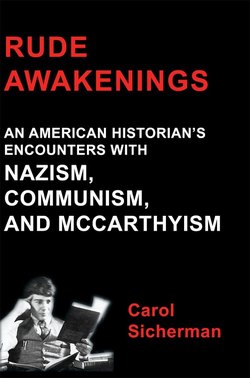Читать книгу Rude Awakenings: An American Historian's Encounter With Nazism, Communism and McCarthyism - Carol Jr. Sicherman - Страница 21
На сайте Литреса книга снята с продажи.
Reaping the benefits
ОглавлениеFor all his grumbling, Harry found a good deal of stimulation in Mayer’s seminars. Early in 1932, when Mayer assigned him to report on two early papers by Engels, he indulged his “natural bent” to nitpick, “avidly seeking Engels’ errors.”99 This was not hard: Engels “was at the time of writing only a year and a half older than I am now.” He found “a certain agreeable peril in discussing Engels before the Engels authority.” He enjoyed Marx’s German Ideology “because it is so vigorously and spicily written”; Marx and Engels “tear into theory…with such gusto and vim and malice that you read it with pleasure.”100 An unanticipated payoff came some years later, when Harry taught “Scientific Socialism of Marx and Lenin” for the Communist student organization of which he was president (see Chapter 6).
In the same semester that he was reading Marx and Engels, Harry took Dietrich Gerhard’s seminar on the British Empire, his paper for which formed the basis of his sole published book. Gerhard assigned two students–Harry and a certain Fräulein Brose– to study the transfer of power in Singapore from the Dutch to the English. Harry was well equipped intellectually. In Paris he had bought a Dutch grammar and dictionary because he wanted to read a Dutch newspaper; “a misleading language” because of its likeness to German, Dutch nonetheless posed little difficulty. He mined the amazing Staatsbibliothek, which held all the “early 19th century things on Singapore…–practically everything in print that is not of purely local Malayan interest.” Gerhard “showed so much interest in the discussion” that other topics had to be postponed.101 Harry was exhilarated to be writing history, not just reading it, for the “Dutch side” of the subject had previously been neglected.
By the end of 1932, Harry’s social skills allowed him to talk with Fräulein Brose, who had just returned from studying in the United States, “about Europe, America, and what not–for three hours.” Eventually they “agreed to swap German and English conversation.” His sociability spread. When a neighbor asked Frau Meyer if she knew anyone who could use a student ticket to the opera, he accepted–even though his fellow opera-goer would be a woman.102 He laughed to think that “after how many years I suddenly in one month make the acquaintance of not one but two girls.” Before long Fräulein Brose and Harry were “doing Hamlet” together. Another session on Hamlet made him exclaim: “My God I’m getting sociable.” One evening Harry accompanied a woman named Eva Sinauer, apparently a guest of the Meyers, to hear the famous diva Fritzi Massary in Oscar Straus’s new operetta Eine Frau, die weiss was sie will (“A Woman Who Knows What She Wants”). His judgment– “perfectly foul”–was not shared by the rest of the audience: the operetta was “one of the last glittering theatrical events that Berlin would ever see” before the Nazi takeover, which forced Massary, a “non-Aryan Christian,” to flee to London.103 Some weeks later, he walked Fräulein Brose home through the Tiergarten from a lecture, grilling her on her political views. It was possible to be friends with a woman, even one like Fräulein Brose with conservative politics.104
On the last day of 1932, Harry summed up his current academic situation in his diary: he had acquired 965 books and pamphlets and had completed his paper on Singapore. Ever self-critical, he castigated his paper as “repetitious, stylistically grotesque, and not properly spatially distributed” but felt confident that Gerhard would be unable “to contradict the ostensible facts.” In the seminar, Fräulein Brose read her piece first; Harry was not impressed. The next week it was his turn: “Read Singapore this afternoon and got hoarse. Gerhard thinks I asked the right questions & gave the wrong answers.”105 He appreciated the value Gerhard put on “the right questions.”
Sometimes Harry attended lectures in other fields. In his last semester, Hans Kauffmann’s lectures on Dutch painting in the seventeenth century fed his love of Rembrandt and Vermeer. Like most art historians in Harry’s view, Kauffmann was “a pleasant lecturer, slow and daintily speaking.” Harry’s initial praise of Kauffmann’s “penetrating” discourse gave way to complaints of seven weeks “wasted…on Rubens.” He enjoyed the lecture on Vermeer but wondered impatiently: “When is he coming to Rembrandt?” Finally Kauffmann delivered “a very fine lecture, full of understanding and feeling,” about Rembrandt as a painter of “the dialectic of life”: he painted the prodigal son when his own son died, and Bathsheba when his beloved Hendrikje Stoffels died. Harry was overcome with emotion by a slide of a self-portrait and another of Jacob blessing his grandchildren. He struggled to describe his feeling:
It is not that ecstasy I feel when I hear [Sigrid] Onegin’s voice–it may be what Spinoza meant with his intellectual love of god. It is less sensual, more appreciative than being dissolved into exquisite sensations by that heavenly voice. I love that man…. Learning to meet Rembrandt is maybe the most important result of these two years.
In Rembrandt, he saw an image of the man he hoped to become: faithful to his ideals and “independent…of his Mitmenschen,” his fellow human beings.106
